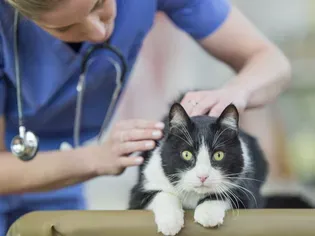How to Know When to Call the Vet for Your Cat
Updated on 04/26/24

How to Know When to Call the Vet for Your Cat: A Comprehensive Guide for Cat Owners
As a dedicated cat owner, you want to ensure your feline friend's health and well-being. Knowing when it's time to call the vet is crucial for timely intervention and proper care. Here's a comprehensive guide to help you recognize the signs and symptoms that warrant veterinary attention:
1. Changes in Appetite or Water Consumption
A sudden change in your cat's eating or drinking habits can signal an underlying health issue. Decreased appetite or water intake could indicate pain, nausea, or an infection. Increased water intake can point to kidney problems or diabetes.
2. Vomiting or Diarrhea
Occasional vomiting or diarrhea is not uncommon in cats, but persistent or severe episodes can be concerning. Vomiting can be caused by dietary indiscretion, parasites, or gastrointestinal issues. Diarrhea can result from infections, allergies, or inflammatory bowel disease.
3. Lethargy or Weakness
If your cat becomes unusually lethargic, weak, or inactive, it's a cause for concern. Lethargy can indicate pain, dehydration, anemia, or respiratory problems. Weakness can stem from underlying medical conditions or injuries.
4. Difficulty Breathing or Coughing
Any signs of respiratory distress, such as difficulty breathing or coughing, should be taken seriously. These symptoms can indicate asthma, pneumonia, or heart disease.
5. Sores, Swelling, or Lumps
The appearance of sores, swelling, or lumps on your cat's body can be a sign of skin infections, allergies, or more serious conditions like cancer. It's important to examine your cat regularly for any changes in their skin or appearance.
6. Urinary Problems
Changes in your cat's urinary habits, such as difficulty urinating, straining, or urinating outside the litter box, can indicate urinary tract infections, crystals, or bladder stones. Blood in the urine is also a concerning symptom.
7. Eye Problems
Redness, swelling, squinting, or discharge from the eyes can indicate conjunctivitis, corneal ulcers, or other eye infections. Prompt veterinary attention is crucial to prevent vision damage.
8. Nasal Discharge or Sneezing
Persistent nasal discharge or sneezing can be signs of upper respiratory infections, allergies, or dental problems.
9. Ear Problems
Cats with ear problems may tilt their head, shake their ears, or scratch at them. Otitis externa (ear infection) can cause pain, inflammation, and discharge.
10. Behavioral Changes
Sudden changes in your cat's behavior, such as aggression, hiding, or excessive vocalization, can be indicative of underlying medical issues or cognitive decline.
11. Injuries
Any signs of injury, such as wounds, fractures, or dislocations, require immediate veterinary attention. Even minor injuries can lead to infection or other complications if not treated promptly.
12. Pregnancy
If your cat is pregnant, it's crucial to schedule regular veterinary checkups to monitor her health and the kittens' development. Signs of pregnancy include enlarged abdomen, weight gain, and changes in behavior.
13. Emergency Situations
In certain cases, such as seizures, poisoning, or heatstroke, urgent veterinary care is necessary. These situations can be life-threatening and require immediate professional assistance.
Remember:
* Trust your intuition. If you have any concerns about your cat's health, don't hesitate to contact your veterinarian.
* Provide your veterinarian with as much information as possible about your cat's symptoms, including their frequency, duration, and any other relevant observations.
* Being prepared and informed can help you make the best decisions for your feline companion's well-being.
By following these guidelines and being observant of your cat's behavior and health, you can ensure that they receive the timely veterinary care they need to live a long and healthy life.
Explore More Pets

Cat Behavior Problems
How to Stop Aggression in Kittens

Long-Haired Cat Breeds
Siberian Cat: Breed Profile, Characteristics, & Care

Cat Behavior Problems
How to Stop Kittens From Scratching and Biting

Long-Haired Cat Breeds
Turkish Angora: Cat Breed Profile, Characteristics & Care

Basic Training
How to Socialize Your Kitten

Short-Haired Cat Breeds
Cute Pictures & Facts About Calico Cats & Kittens

Litter Box Training
Training Your Kitten to Use the Litter Box

Long-Haired Cat Breeds
10 Fun Facts About White Cats